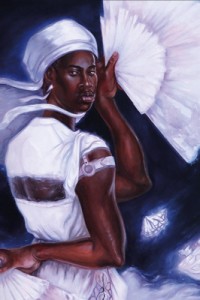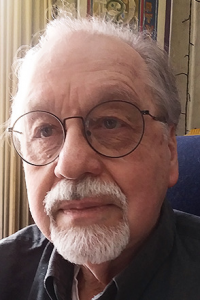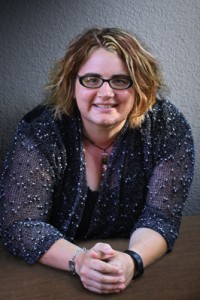Dublin 2019: An Irish Worldcon Report
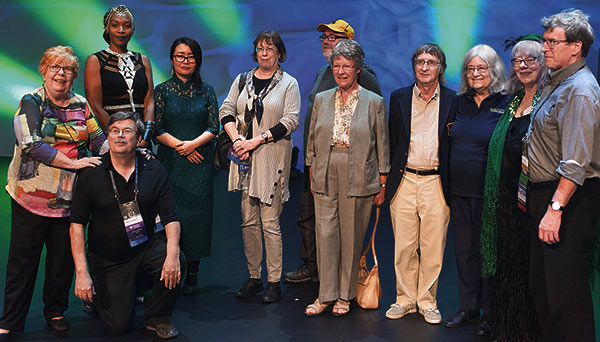
Dublin 2019, the 77th World Science Fiction Convention, took place August 15-19, 2019 at the Convention Centre Dublin in Ireland. Guests of honour were Diane Duane, Ginjer Buchanan, and Ian McDonald; other guests of honour were astrophysicist Jocelyn Bell Burnell, fans Bill & Mary Burns, and game creator Steve Jackson. There were 6,024 attending memberships purchased, with 5,814 warm bodies, compared to San Jose’s 5,440 attending members and Helsinki’s 5,949. Adding Dublin’s 1,505 supporting memberships and 793 day passes, dealer, and creator passes, the total registered membership was 8,322, compared to San Jose’s 7,812 and Helsinki’s 8,753.
Situated in the city center’s Docklands area, the CCD comprised a set of relatively small wings and rooms right next to the river Liffey. Children’s programming was held one block west at the Spencer Hotel, and the art show was set up at Point Square, several blocks east. Most official parties were held inside the center, but a few con parties and many private parties happened off-site, at hotels several blocks away. Outside temperatures ranged from comfy to sweltering, with occasional showers, while the CCD itself remained comfortable.
There was no con suite and the only dining option at the convention facility was Martin’s Bar, the at-con bar named after Martin Hoare. Pricey choices awaited within a few blocks, but congoers willing to range farther could find ample options, and the conrunners provided a restaurant guide on the website.
One panel was Wednesday evening, “Oppy or Armstrong? Autonomous vs. Human Space Exploration,” but events began in earnest Thursday morning with filking, plays, and yoga. Registration opened Tuesday afternoon, though day passes were unavailable for at-con purchase.
Opening Ceremony MCs Ellen Klages and Dave Rudden presented the Big Heart Award to Alice Lawson; also presented were three First Fandom awards: the Sam Moskowitz Archive Award to Bradford Lyau; the First Fandom Posthumous Hall of Fame Award to Bob Shaw, James White, and Walt Willis; and the First Fandom Hall of Fame Award to Ray Faraday Nelson. Presentations were also held for the Seiun Awards and the Prometheus Awards; winners were announced earlier in the year.

PROGRAMMING
The programme division reported “over 1100 programme sessions, presented by 780 programme participants…. A little under half (476) of the sessions were panels….” There were 42 workshops and classes, with highlights including two featuring guests of honour (Diane Duane on writing and Ian McDonald on gin), several items featuring works by Travellers (including a reading by Kathleen Lawrence of “Beady Pocket” by Rosaleen McDonagh) , and many more ranging from writing to publishing to costuming to acting. “GoH Steve Jackson was featured in daily programme in the Games Hall.” The schedule and convention guide was available via the Grenadine mobile app and website interface, with areas of interest including academic, art, costuming, gaming, literature, writing, and technology, plus items for children. The schedule showed 1,218 items (up from 2018’s 771 items, 931 in 2017, and 2016’s 1,029 items) with 37 items on the children’s track (up from 18 in 2018 but down from 62 in 2017 and 38 in 2016); and included 184 kaffeeklatsches, 99 readings, 45 concerts, 4 Strolls with the Stars, and more.
Ric Bretschneider hosted the Masquerade Saturday night. The Awards for Best in Show: Presentation went to Lance Ikegawa and Best in Show: Workmanship to Alicia Faires (AKA Leanna Cosplay).

EXHIBITS & DEALERS’ ROOM
There were over 50 separate exhibits and displays between the Warehouse and the CCD. Exhibits division head Paul Taylor said, “The opportunity arose to take additional space in the nearby Point Square building, with its Odeon cinema screens and a large empty cave of a space called ‘the Warehouse.’ The extra space transformed what we were able to aim for, both in terms of the convention’s activities and in terms of membership capacity…. Experienced Worldcon-goers will have known to expect displays highlighting the work of our Guests of Honour…. Other items were a twist on the expected, like the Hugo Awards display, where the traditional array of trophies was replaced by a slideshow of specially taken photos of past trophies, while this year’s trophies – for both the Hugos and the Retro-Hugos – gave members a chance to ‘Hold a Hugo’ themselves, and to have their photographs taken. There were more photo opportunities with the Starfleet bridge simulator USS Cuchulain, and a DeLorean sports car – a piece of Northern Irish engineering here fully kitted out with a Back-to-the-Future flux capacitor and other equipment. Other displays were marvels of work and ingenuity, like the Lego displays produced by the Irish Lego community brick.ie, including a recreation of the Battle of Hoth. ” There was also a booth with information about Travellers, who’ve recently been recognized as an ethnic minority in Ireland.

The dealers’ room, with about 60 hucksters from different countries, included booksellers, publishers, jewelers, costumers, game vendors, and everything in between. The hall simultaneously served as Creators Alley, aimed at smaller traders and artists, “creating and selling their own goods… often for only one or two days.” Nicky Crowther of PS Publishing said, “The space was light, airy and spacious…. Sales were excellent, but it was an expensive venture for us…. The most brilliant thing was the volunteer help at the beginning and end of the convention…. Thank goodness for volunteers as the conventions wouldn’t be able to run without them. I think some kind of a reward system like the groats is a great one but I’m not sure that it was working that successfully at the convention. Quite a few people were not clear how it worked and there didn’t seem to be a specific place for people to go to exchange them…. So all in all a great convention from our point of view.” Bob Brown of B Cubed Press said, “The dealers room was likely as good as I’ve seen at any World Con…. The traffic was excellent…. Sales were great, sold out of some titles, sold more than half of all. My highlight was that Jim Wright, a writer in our most recent (Alternative Apocalypse) told his readers to come by and buy the book and post a selfie…. The staff in the dealers room was also friendly and professional. What I really liked were the Groats…. I collected about 50 and made sure I spent them back with other venders….” Gemma Creffield of Angry Robot said, “The Angry Robot stand was pretty busy the majority of the time, except for Monday. Not sure it was worth us being there the extra day…. Lots of people stopped by for our author signings throughout the Con – it was really lovely having so many of our authors there and able to connect with their fans. It was a little frustrating that we weren’t allowed hot drinks in the dealer’s area… cons tend to run on coffee…. But that, and the Groat conversion fiasco, were my only two gripes really….” Tachyon’s Jacob Weisman said, “Sales were brisk and traffic lively in the Dublin dealer’s room. We sold almost everything we brought. It helped that we had lots and lots of Peter S. Beagle books and Peter signed at our table several times.”
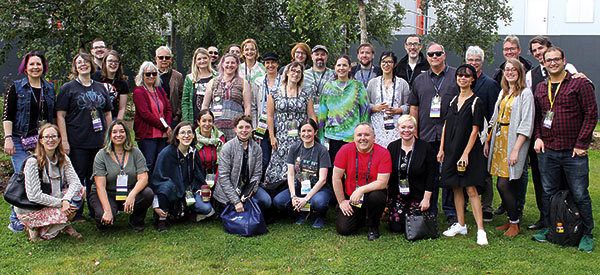
ART SHOW
Art Show heads Alice Lawson, Serena Culfeather, and John Wilson said, “The Dublin 2019 Art Show became an exercise in what happens when the event grows in popularity beyond the size of the convention centre it will occupy. Towards the end of 2018, it was a hard decision to agree that the Art Show, if it was to be worth having, had to re-locate.” The art show exhibited 1,222 pieces including one huge 7′-tall sculpture. The heads said, “Our 72 artists came from all round the globe and we had four ‘featured artists’ who added an extra element of Wow – Maeve Clancy and Jim Fitzpatrick, both Irish, Afua Richardson from the USA and Sana Takeda from Japan….” Best in Show went to Jim Burns for “Jane Delawney”, Best Traditional to Johnman (John Green) for “We Are All Majestic”, and the Spirit of Dublin Award to Paul Sheridan for “An Unexpected Pub Crawl: Temple Bar”. The print shop featured almost 1,000 pieces. Sales from gallery and print shop totaled roughly €40,000.
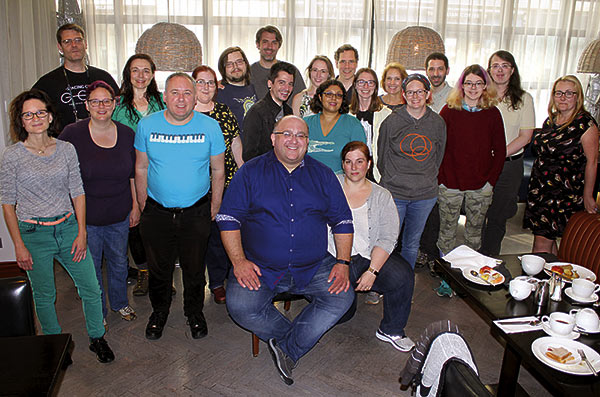
PARTIES
At least 16 parties were mentioned in the weekly newsletter, hosted by bids and others, including Finnish Fandom, Glasgow in 2024, the Dead Dog party, and a disco.
The Spencer Hotel bar provided a lively if sometimes noisy bar for mingling, with a mostly open plan that made spotting friends easy. Music drove congoers away one evening.
Publisher parties included Gollancz, Titan, Angry Robot, and Rebellion, as well as book launches and events by indie presses. A few parties were in meeting rooms in the convention buildings, but many were offsite at restaurants or bars. This year’s Hugo Losers Party was a joint effort by George R.R. Martin and his team, Dublin 2019, and CoNZealand 2020. Held at the Guinness Storehouse, the party event opened with a riverdance performed on three floors and featured small, tasty dishes, open bars, Guinness-based cocktails, music, and the presentation of the Alfie Awards, given by Martin and Parris McBride to editors Jane Johnson and Malcolm Edwards for their editing. It was also unfortunately overbooked and many invitees were not admitted. Martin posted an explanation about that on File770.

CON PUBLICATIONS
The souvenir book was 176 pages, with cover art and some interior images by Iain Clark. Contents included a greeting from the chair, essays honoring the GoHs, sections on special guests and featured artists, pieces on select Irish authors, a list of Hugo Awards winners since ’53 and Retro Hugo Awards winners since ’39, the full committee list, a WSFS business material insert, and an In Memoriam page. Worldcon 77 also provided a 8.25″ x 3.9″ pocket convention guide: 93 pages with listings and maps; as well as a 25-page events guide.
The 18-page awards program included a “Welcome” from ceremony hosts Afua Richardson and Michael Scott, a short explanation of the awards, lists of finalists, and acknowledgments.
The Salmon of Knowledge, the at-con newsletter, had early and late editions for a total of 12 issues, plus a 13th spoof issue. The newsletter featured site selection results, programming updates, events, useful information, the Masquerade winners list, and more.

HUGO AWARDS
Con chair James Bacon said, “I loved the Hugo Awards and I lost a Hugo! In all honesty, I was exceptionally pleased about the overall event and really proud of the teams who brought it together. I thought Afua Richardson and Michael Scott were fantastic. We had some difficulties with our captioning system, for which I am sorry. Overall, the response to the awards was fabulous and I’m grateful to the finalists and everyone who helped make it a success.”
The 66th Hugo Awards Ceremony took place at 8:00 p.m. on August 18, 2019 in the auditorium of the Convention Centre Dublin. The masters of ceremonies were Eisner award winner Afua Richardson and prolific Irish author Michael Scott, who both had opportunities during the ceremony to present about their work, inspiration, and lives.
On behalf of last year’s winner, Rebecca Roanhorse, Ada Palmer presented the John W. Campbell Award for Best New Writer, which went to Jeanette Ng. In a speech later hotly discussed online, Ng said, “Campbell, for whom this award was named, was a fucking fascist…. But these are bones of the genres we are given, but from that we have grown a wonderful, ramshackle genre, wilder and stranger than his mind could ever dream, or even would allow. And I am proud, and I am humbled to stand before you, a girl born in Hong Kong, to thank you for this…. Hong Kong is the most cyberpunk city in the world. But protestors are struggling with the masked, anonymous stormtroopers of an autocratic Empire…. and I’m going home right now for it.”
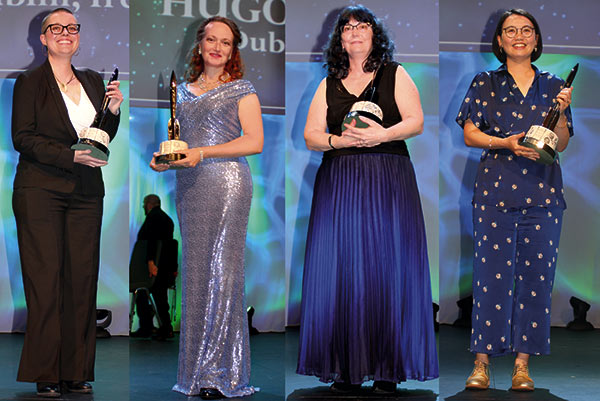
Scott presented the Lodestar Award for Best Young Adult Book, which went to Children of Blood and Bone by Tomi Adeyemi. Bobbi Armbruster accepted the award for Adeyemi with a simple “thank you.”
Richardson presented the first Hugo Award of the night, Best Fan Artist, to Likhain (Mia Sereno). Likhain thanked R.B. Lemberg, “the first editor to accept my foray into speculative fiction,” Rochita Loenen Ruiz, Aliette de Bodard, “the Idlers by Bamboo, the naggy cousins I never knew I needed,” fiancée Erica Norwood, and more. She said, “This award is for me but it’s also for people who are like me, because art is not an easy path to tread. Who are now where I have been; young Filipinos and creatives over the world who need to be seen, even though everything seems covered in darkness, and are struggling with creation when surrounded by so much destruction. Nakikita ko kayo. Kailangan namin kayo. Inaabangan namin kayo. I see you. We need you. We await you.”
The Best Fan Writer Award went to Foz Meadows. Liz Bourke accepted for Meadows, saying, “Every day, our words cross borders effortlessly – without visas, without hindrance, without guns or camps or cruelty – and yet the bodies of so many people cannot…. The internet has changed the world for voices, but we are yet to prove so welcoming of bodies. But what else are science fiction and fantasy for, if not for this: to postulate new worlds, new systems, new ways of being human…. This is why I write, and this is how I use my voice; I am grateful to all who listen and speak with me. Thank you.”
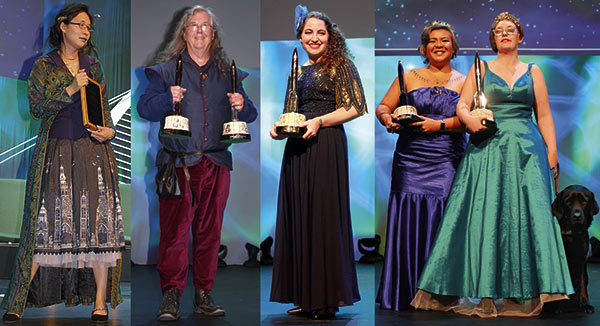
The Best Fancast Award went to Our Opinions are Correct, hosted by Annalee Newitz and Charlie Jane Anders. Anders thanked the World Con organizers, everyone there, everyone who voted, and Newitz. She said, “We’re geeks, and we believe that if it didn’t get over-analyzed to death, it didn’t happen!” to riotous laughter and applause. Newitz said that podcasting “is really about invoking community. And one of the many things that’s given us hope in these extremely difficult times is being able to reflect on how this community here is telling stories that ease our pain….” Newitz thanked their producer Veronica Simonetti, patrons, and Anders, as well as partners Chris Palmer and Jessie Burns.
Best Fanzine went to Lady Business, edited by Ira, Jodie, KJ, Renay, and Susan. “2018 was a bit of a trash fire for all of us… but despite that so many wonderful people kept creating incredible media and it’s a privilege to have to talk about it with all of you.” They thanked absent members Jodie, KJ, Renay, and columnists Jenny and Anna, team sparkle rocket, and the community, saying, “We love that this community actively supports a space carved out by us and you and many others… for long-form intersectional feminism. This is our home and your home too.”
Best Semiprozine went to Uncanny, edited by Lynne M. Thomas and Michael Damian Thomas, Michi Trota, podcast produced by Erika Ensign and Steven Schapansky; including the Disabled People Destroy Science Fiction special issue edited by Elsa Sjunneson-Henry and Dominik Parisien. Sjunneson-Henry and Trota accepted, thanking the 2018 regular staff, including Mimi Mondal, Stephanie Malia Morris, Chimedum Ohaegbu, and Caroline M. Yoachim, and the special issue staff, including Nicolette Barischoff, S. Qiouyi Lu, and Judith Tarr. They thanked the Thomas’s daughter Caitlin, the Space Ranger Corps, the authors, and the voters. Sjunneson-Henry said, “If you’re disabled and you’ve ever been told you don’t belong in publishing, or just the world in general, this award, this rocketship, it’s ours to use to reach the stars.”

Richardson addressed the audience, talking about inspiration, choosing heroes, and the magic of Worldcon. She said, “It can give you the opportunity to meet people who have inspired you…. My inspiration, like so many girls across the world, was on my TV in the shape of Lt. Nyota Uhura, played by the amazing Nichelle Nichols. Nichelle’s visibility provided a mirror to see myself in space as an engineer or as anything I wanted to be. Did you know she recruited the first women of colour to be astronauts? I mean she literally went in person to convince amazing ladies like Mae Jemison to apply. Her example would extend across decades, back to my father – a physicist and SF fan himself, as well as my older sister, who is a senior engineer at Lockheed Martin Space…. Nichelle Nichols helped millions of little boys and little girls see themselves in the stories they love… I am dedicating this performance to Nichelle and to my grandfather, Edward Lee Jenkins.”
Then Richardson, accompanied by the Dublin Video Game Orchestra, performed Stand By Me; after which Steven H Silver presented the In Memoriam video, recognizing fans, authors, editors, and artists who died in 2018 and 2019.
The award for Best Art Book went to The Books of Earthsea: The Complete Illustrated Edition, Ursula K. Le Guin, illustrated by Charles Vess. Vess said, “It was a big book, wasn’t it? I spent four or five years of my life on that book!” He thanked Joe Monti and Le Guin, saying, “It was really a privilege trying to get inside of her brain, and what an interesting brain it was!” Vess also took the Hugo Award for Best Professional Artist. He called for a toast to Le Guin, saying, “She always kept me on my toes, even when I didn’t want to be on them!”

Gardner Dozois won Best Editor Short Form. Son Christopher Casper accepted, saying, “[Gardner] would say this award really wasn’t for him. This award goes to all the wonderful writers that were in the book…. He’d be so happy at the amazing young writers that are keeping this business going… and very very proud of the future of science fiction.”
Navah Wolfe won the Best Editor Long Form Award. She thanked her husband, her parents, the Saga team, the writers who work with her, and fellow nominees. She said, “Thank you to all of you: this whole weird and wonderful industry who welcomed me with open arms.”
Best Dramatic Presentation Short Form went to The Good Place: “Janet(s)”, written by Josh Siegal and Dylan Morgan, directed by Morgan Sackett. The award was accepted via video by D’Arcy Carden and Megan Amram.
Best Dramatic Presentation Long Form was won by Spider-Man: Into the Spider-Verse, screenplay by Phil Lord and Rodney Rothman, directed by Bob Persichetti, Peter Ramsey and Rothman. Barbara Murphy and Alison Keegan from Sony Ireland accepted.
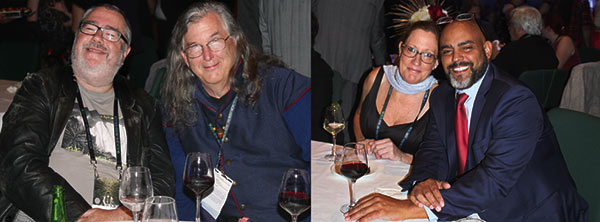
Nicholas Whyte presented the award for Best Series to Becky Chambers for the Wayfarers books. Chambers talked about the possibilities and power of conventions, and going to LonCon, where she met her editor. She said, “It may be my name on this thing, but I never forget for a second that this series exists because of the kindness of strangers and this weird, wonderful family that meets once a year. So this one’s for you, Worldcon. Thank you for letting me pull up a chair.”
The Hugo for Best Graphic Story was won by Monstress, Volume 3: Haven, written by Marjorie M. Liu and illustrated by Sana Takeda (Image Comics). Nicole Kimberling accepted the award on behalf of the creators.
The award for Best Related Work went to Archive of Our Own, by nonprofit The Organization for Transformative Works. The award was accepted by Alex, Lim, James_, volunteers, and Naomi Novik, who read the acceptance speech: “All fanwork, from fanfic to vids to fanart to podfic, centers the idea that art happens not in isolation but in community…. This Hugo will be joining the traveling exhibition that goes to each Worldcon, because it belongs to all of us.”
The winner of Best Short Story was “A Witch’s Guide to Escape: A Practical Compendium of Portal Fantasies” by Alix E. Harrow. Esther MacCallum-Stewart accepted for Harrow, saying, “You think writing is a lonely business until you sit down to thank the people who made it possible.” Harrow thanked her elementary school library, her kids, her husband, Laura Blackwell, the Apex team, everyone who helped promote the story, and the other nominees.
Best Novelette went to “If at First You Don’t Succeed, Try, Try Again” by Zen Cho. Cho thanked the Idlers by Bamboo, Miri Kim and Hana Lee “for telling me about the imugi (the Korean mythological creature my story is about) and helping with research,” Lee again with Perrin Lu and Kara Lee for beta reading, Joel Cunningham of the Barnes & Noble SFF blog, and Shirley Jackson for the cover illustration. She said, “It’s a story about failure, crashing failure, and I wrote it because I felt like a crashing failure. And I’m really thankful to all of you for voting for this story and turning my years of failure into this glorious moment of success.”
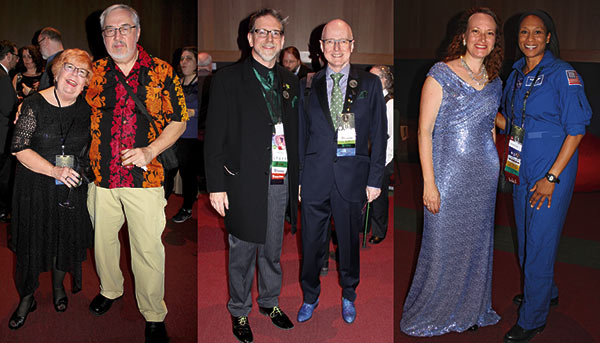
Artificial Condition by Martha Wells won the Best Novella Award. She thanked everyone who voted, saying, “I’m just so honored that you picked me out of this incredible field of novellas.” She thanked agent Jennifer Jackson, Michael Curry, editor Lee Harris, Irene Gallo, “and everyone else at Tor.com,” Kevin R. Free who narrates the audiobook editions, cover artist Jaime Jones, and Wells’s husband Troyce Wilson.
Astronaut Jeanette Epps presented the Best Novel Award to Mary Robinette Kowal for The Calculating Stars. Kowal thanked Alyshondra Meacham, Liz Gorinsky, Seth Fishman, Robert Kowal, her mom and dad, niece Katherine Harrison, and others. She said, “One of the things that I do when I start writing is that I look in history for the women, people of color, LGBTQ, people with disabilities… I assume that they were present and erased from the narrative…. This award is for the first lady astronaut trainees, Jerrie Cobb, Bernice Steadman, Janey Hart, Jerri Truhill, Rhea Woltman, Sarah Ratley, Jan and Marion Dietrich, Myrtle Cagle, Irene Leverton, Gene Nora Jessen, Jean Hixson, and Wally Funk, and everyone who has been pushed to the margins. I promise you that I know you were there. I know you still are. I see you. I promise that you will have a place in my fiction and in my life.”
WORLDCON 2019 AND BEYOND
The 78th World SF Convention, CoNZealand, will be held July 29 – August 2, 2020 in Wellington, New Zealand at TSB Arena, Shed 6, Michael Fowler Center, and the Intercontinental Hotel, featuring guests of honor Greg Broadmore, Larry Dixon, Mercedes Lackey, and Rose Mitchell, with George R.R. Martin as toastmaster.
The 79th World SF Convention, DisCon III, will be held August 25 – 29, 2021 in Washington, DC at the Marriott Wardman Park Hotel, featuring guests of honor Nancy Kress, Malka Older, Sheree Renée Thomas, Toni Weisskopf, and Ben Yalow.
– Arley Sorg & Liza Trombi
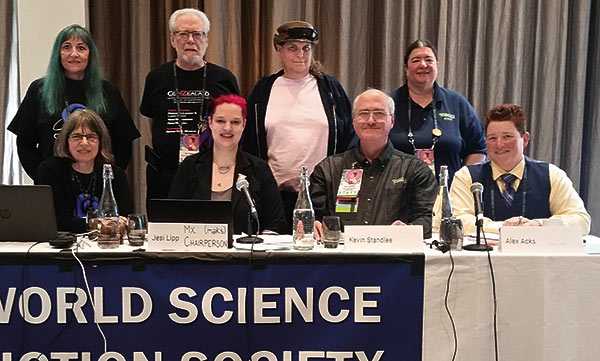
2019 WSFS Business Meeting
This year’s World Science Fiction Society Business Meeting got through lots of business, requiring an extra day’s meeting, but had little immediate effect.
A proposal for a Best Translated Novel category (for novels translated into English) was killed quickly. Proponents’ arguments included shrugging off “our Anglocentric perspective.” Opponents, including several publishers of translated works, wanted translated fiction to continue to be eligible in the main fiction categories, where it has occasionally won. A particular concern was that this proposal was only for novels whereas most published translated work is short fiction.
A related resolution encouraging Worldcons to present trophies to the translators of works that win a Hugo Award in translation was defeated. Opponents noted that Worldcons already have the authority to do this, as they did in 2015.
A proposal for a Best Game or Interactive Experience Hugo Award was referred to a committee for further discussion.
The proposal to reduce the number of nominated works/people required to be listed in the post-awards statistics, which passed last year, failed ratification on a narrow 41-44 vote. Many Hugo watchers love their statistics.
Two works had their Hugo Award eligibility extended due to limited distribution: the movie Prospect and the documentary Worlds of Ursula K. Le Guin.
Two technical changes were ratified:
- Adding Best Series to the list of “written fiction” categories
- Changing the name of the Graphic Story Hugo Award to “Best Graphic Story or Comic” (the definition of the category, which already included comic books, remains unchanged)
Several changes to the WSFS Constitution received first passage but will not take effect unless ratified in 2020:
- Clarification that each Worldcon is responsible for their year’s Hugo Awards, and no other (making it impossible for a future Worldcon to “withdraw” a Hugo Award presented in a previous year)
- Provision for a limited-scope WSFS Business Meeting to handle NASFiC site selection in rare cases when a NASFiC is selected by another NASFiC, as happened this year
- Clarification that if members do not know their membership numbers when voting on the Hugo Awards or Site Selection, the Administrator may look it up rather than disqualifying the ballot
- Clarification of those cases when Hugo Award Administrators can move nominations between categories on an individual voter’s ballot
- Modification of Best Series to not allow a series to become re-eligible solely because of republication in another country in English (the republication rules are intended to help translated and non-US-published works, and with a series the rules are intended to not allow it to be eligible every year; books in series are often published in consecutive years in the UK and USA)
- Require Worldcons to sell supporting memberships through the close of Site Selection (a reaction to Dublin stopping attending membership sales, but not supporting, in advance this year)
- Modification to the meaning of “public display” in regard to the Artist categories by adding “posting on the internet, in online or print-on-demand shops, or in another setting not requiring a fee to see the image in full-resolution” to the definition.
Two proposals received first passage with significant amendments:
- A proposal to remove the deadline by which one must be a member of an eligible Worldcon to be able to nominate for the cur rent year’s Hugo Awards was altered. The new version, passed on to 2020, keeps a deadline but puts it back from December to the end of January (as it was before 2017)
- The other proposal was to drop the number of finalists in each Hugo Award category back down to five for 2021. This was scheduled to happen in 2022 under a sunset clause. The motion was amended to make the change to six finalists permanent effective in 2021, and it is this that will be voted on next year.
Two proposals were referred to committees with instructions to report back next year:
- Making data-sharing between Worldcons more closely compliant with rules such as GDPR
- Separating WSFS voting membership from the right to attend Worldcon, with the effect that voting rights cannot be re-sold, whereas attending rights can.
The meetings were recorded and posted to the YouTube Worldcon Events channel (<https://tinyurl.com/2019WSFSBM>). Full details of the changes to the WSFS Constitution will be available in due course at the World Science Fiction Society’s website, <wsfs.org>.
–Kevin Standlee & Cheryl Morgan
From the October 2019 issue of Locus.
 While you are here, please take a moment to support Locus with a one-time or recurring donation. We rely on reader donations to keep the magazine and site going, and would like to keep the site paywall free, but WE NEED YOUR FINANCIAL SUPPORT to continue quality coverage of the science fiction and fantasy field.
While you are here, please take a moment to support Locus with a one-time or recurring donation. We rely on reader donations to keep the magazine and site going, and would like to keep the site paywall free, but WE NEED YOUR FINANCIAL SUPPORT to continue quality coverage of the science fiction and fantasy field.




